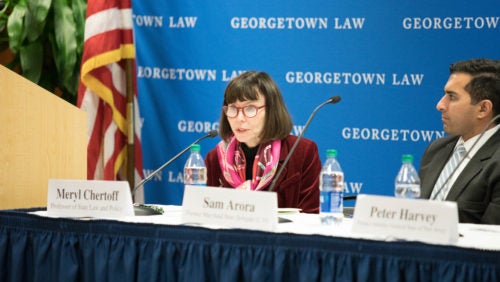Georgetown Law Launches Program on State and Local Policy and Law
December 17, 2019

SALPAL Executive Director Meryl Chertoff and Panelist Sam Arora (L'10) at SALPAL's inaugural event in November.
The allure of studying law in the nation's capital draws many students to Georgetown Law. A new academic program aims to remind them that opportunities to make a difference extend far beyond Washington, D.C.
Georgetown Law has launched the Program on State and Local Policy and Law (“SALPAL”) to serve as both a think tank and as a means for students to explore and pursue careers in state and local government.
“They’re interested in public service, and we want to make them aware that public service doesn’t end at the base of Capitol Hill – that public service opportunities exist around the country,” says SALPAL Executive Director Meryl Chertoff, who is also a Georgetown Law adjunct professor. Georgetown Law Professor Sheila Foster, an urban law and policy expert, serves as SALPAL’s faculty advisor.
“LABORATORIES FOR DEMOCRACY”
Legal and public policy innovation that takes place at the state and local levels goes somewhat under the radar, Chertoff says, but states and cities across the country have traditionally led advances in a variety of areas, such as health care, education, environmental protection, and transportation.
SALPAL will provide a forum for scholars, opinion makers, and intergovernmental affairs experts to explore how state and local legal authorities can promote policy change and as well as the limits of that that potential. It will also provide Georgetown Law students with relevant courses offerings and assistance with securing opportunities in state and local courts, legislatures, agencies, and nonprofit organizations.
At SALPAL’s inaugural event in November, Foster explained that the federalism notion of states as “laboratories for democracy” has resonance again in a time of polarization and stasis at the federal level.
“It once was that federalism was the province of the party out of power nationally, but things have changed,” Forster said. “And it’s not just about states, but it’s about cities as innovators.”
“This is a rich area of study and not enough has been done,” she said.
Georgetown Law is particularly well-suited to house an endeavor like SALPAL, Chertoff says. Washington is home to the leading organizations tied to state and local law and policy, including the National Governors Association, the National Conference of State Legislatures, and the United States Conference of Mayors.
Additionally, Georgetown alumni already are spread out throughout the country in leading legal and policy roles on the state and local levels. Georgetown Law Dean William M. Treanor emphasized the accomplishments of alumni at “A Career in State and Local Government,” SALPAL’s November panel discussion.
“They’re making a difference,” he said. “That’s something we take great pride in, and we want to see more of that in the years ahead. So this is a center that’s really focused on making that a reality.”
CAREER PATHS
Panelists offered perspectives on their experiences as state attorneys general, legislators, agency officials, and legal counsel.
“I would always advise law students to consider public service, if not right away then at some point during their careers,” said Mark Tuohey, former director of Washington D.C.’s Office of Legal Counsel and a partner with Baker Hostetler LLP. “And a state and local opportunity is also very unique.”
Panelist Sam Arora (L’10) launched himself into a public service role even before graduating. He campaigned for a seat in the Maryland General Assembly as a 3L, winning it at age 29. At one point he asked audience members to raise a hand if they’d ruled out the idea of ever running for public office. Arora, now vice president and general counsel with healthcare staffing provider The Arora Group, Inc., was pleased to see relatively few hands pop up.
“I’m glad that at least 75 percent of the audience is open to it,” he said, “because you never know when the opportunity to serve your neighbors in that way will arise.”
STATE ATTORNEYS GENERAL
Troutman Sanders LLP partner Misha Tseytlin (L’06) and Patterson Belknap Webb & Tyler LLP partner Peter Harvey shared their experiences as leaders in state justice systems. Harvey, who served as the attorney general of New Jersey, said state attorneys general have a unique ability to right wrongs.
“AGs can fix things,” Harvey said. “People aren’t going to fight over $25, but the AG can fight over $25 for 500 people, which makes a difference in the lives of people who can’t afford to hire a lawyer or know how to hire a lawyer.”
Tseytlin, who served as Wisconsin’s first solicitor general after the position was created, also noted the increasing ability of state attorneys general to band together and successfully mount legal challenges to perceived misuse of federal authority.
“I don’t think it’s a coincidence that state AGs both under the prior administration and the current administration have been so successful in pushing back on federal overreach on behalf of the states,” he said.
As for career advice, both Tseytlin and Harvey touted the value of judicial clerkships, including with state judges.
“It’s almost ridiculous how good it is,” Tseytlin said. “You’re just out of law school and you get to help judges craft opinions that will make law for the country or the state.”
LOOKING AHEAD
More engaging SALPAL programming is already in the works for the spring semester, Chertoff says. Topics will include the role of state and city law enforcement in combatting hate crimes and extremism, and how constitutional doctrines such as preemption can impact state and local efforts to innovate around climate change, immigration and the protection of civil rights and liberties.
Watch the panel discussion from the launch event: